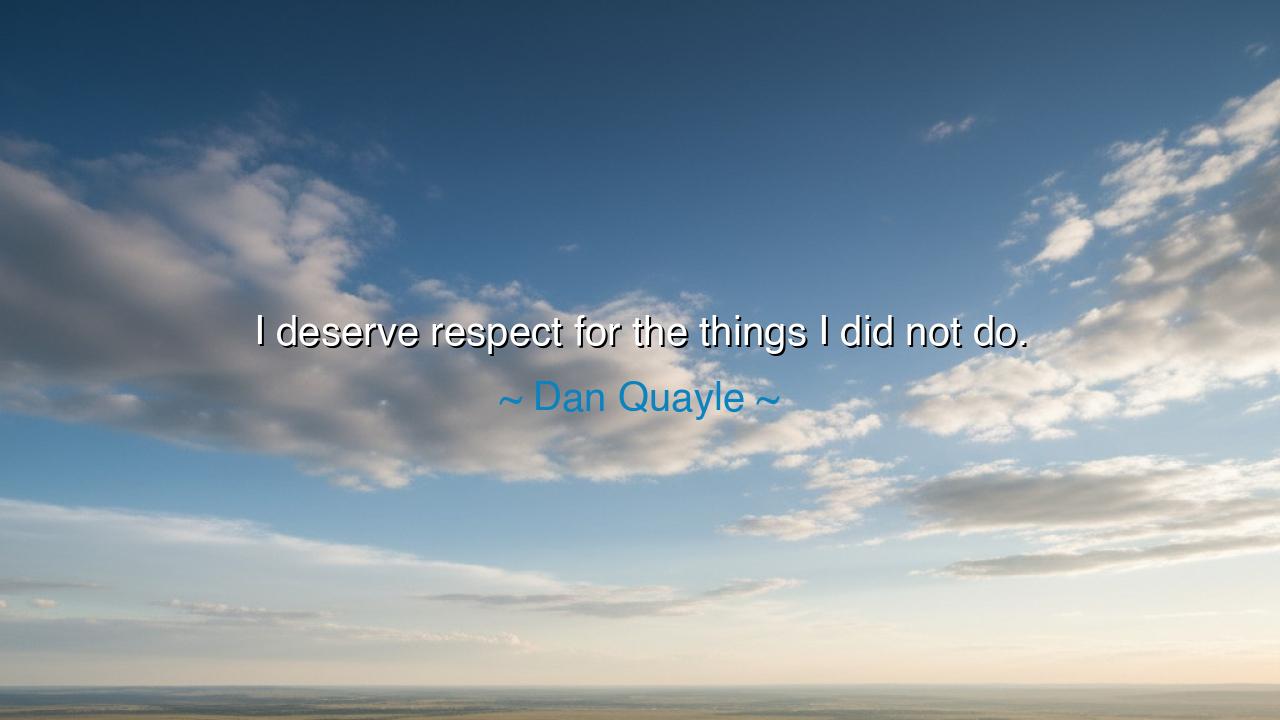
I deserve respect for the things I did not do.






“I deserve respect for the things I did not do.” These words of Dan Quayle, though uttered in the course of worldly politics, reveal a truth that is older than empires: that restraint, though unseen, is often nobler than action, and that the choices we refuse can define us as much as the deeds we perform. For there is courage not only in the battle fought, but also in the battle declined. There is honor not only in the victories claimed, but also in the temptations resisted, the paths avoided, the wrongs never committed.
The ancients knew that not all glory is found in conquest. Sometimes it is the unbroken silence, the withheld sword, or the avoided betrayal that testifies most clearly to a soul’s strength. To boast of what one has done is common; to be remembered for what one has not done is rare. Yet often it is these unseen choices—the refusal of cruelty, the rejection of corruption, the turning away from selfish ambition—that shape a destiny. Respect is earned not only by our visible triumphs but by our hidden discipline.
Consider the story of George Washington at the end of the American Revolution. Victorious, beloved, and standing at the height of power, he might have seized the crown and become king. The world expected it; many urged it. Yet he refused. He laid down his sword and returned to his farm. In that which he did not do—the grasping of power—he gained a greater respect than he might ever have won in ruling. His restraint became his greatest legacy, teaching the world that true strength is the mastery of the self.
So it is in our own lives. Many will praise us for the deeds they can see: the houses we build, the victories we claim, the honors we wear. But there is another kind of respect, quieter yet deeper, reserved for those who say no when it would have been easy to say yes. The person who refuses to lie when the truth is costly, who will not betray a friend for gain, who does not repay hatred with hatred—these are the ones who deserve honor not for what they did, but for what they did not do.
O children of the future, learn this wisdom: temptation will come to you as it has to all before. It will whisper that no one will know, that no one will see, that no one will care. Yet the unseen choices are the pillars of your character. What you do not do when none are watching may speak louder than the grandest deeds you perform before the crowd. In restraint lies integrity, and in integrity lies true respect.
The lesson, then, is clear: do not measure your worth only by your accomplishments. Measure also by your refusals. Be proud not only of the mountains you have climbed, but of the valleys you did not descend into. Seek respect not only for the victories that bring applause, but for the silences, the abstentions, the self-denials that keep your spirit untainted.
Therefore, practice the discipline of refusal. When corruption tempts you, resist. When vengeance calls, walk away. When pride urges you to boast, be silent. In these small, unseen victories, you will forge a soul that commands reverence. And when your story is told, let it be said not only of what you did, but also of what you had the strength not to do.
So I say unto you: honor yourself for the paths you refused, for the wrongs you denied, for the evils you left undone. For in those refusals lies a greater triumph. And in that triumph, you will find the deepest, most enduring respect.






AAdministratorAdministrator
Welcome, honored guests. Please leave a comment, we will respond soon